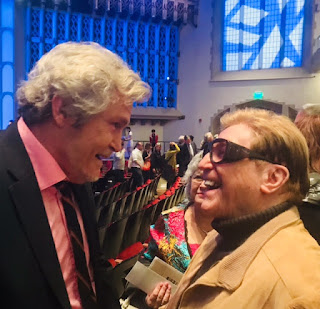There are always clues when one is writing, signals that confirm you are headed in the right direction (or not). I loathe the chatter that posits “the universe” as an entity that is responsible for everything from getting a parking ticket to meeting the man of your dreams (perhaps the reason for the parking ticket). I prefer synchronicity. Or how about magic?
When I received an invitation to attend the Los Angeles Times Book Prizes honoring 87-year old John Rechy with a Lifetime Achievement Award, as I was writing a show about trying to find my libido, I knew I’d hit mystical pay dirt (or, okay, maybe it was reverberations from The Universe).
photo by Zo Harris
Book Prize Ceremony at the Los Angeles Times Festival of Books
I read City of Night when I was a teenager in St. Louis , Missouri , plotting how to get out of the Midwest and live in New York or Hollywood St. Louis to attend a prestigious acting school in Chicago , it was Rechy’s organic L.A.
I was one of them.
My attraction was complex because it went beyond what one could see, excavating his interior rooms without trying; it was his harrowing vulnerability that mirrored my own.
I met this brilliant creature about forty years ago and he is someone I can truly call a friend. I like to tell the story that defines John best. When the press lavishes praise on your work, the phone rings off the hook (we had phones, and faces, then) with gadabouts cooing into your ear, yearning for a chunk of your success. But when you get a negative review? For weeks after, your “friends” would avoid you at the car wash or the grocery store. Not John. He called before the ink had dried on a Times (I think) review that denigrated me venomously. He soothed me with his wit, his battle cries, his tales of resilience. That phone call remains embedded in my heart. There were many phone calls through the years, and letters, now emails.
When they began his introduction at the LA Times event, with a fervently charged video, I began to cry and the crying began to flow into sobs (like you only do at home in your bed in the dark). An epiphany—even though I must have had these realizations before, it was never clearer that Rechy was the one who gave me permission to find art in my sexuality. It was his fearlessness, his ferociousness, his freakishness that whispered in my ear, “You are okay, buddy. Be sexual. Don’t hide. Be who you are.” And in those moments, as the video revealed Rechy posing with his gorgeous bronze torso glistening in the sunlight, I thought of my dead comrades who had also been guided by his luminosity—James Carroll Pickett and Robert Chesley, among them—artists who also allowed their libidos to steer their brutal artistic voices.
Then, there he was, on the stage, in the flesh: taking his time, speaking in a low sonorous voice, dressed with understated butch elegance (is that oxymoronic?), accepting the award with sincere graciousness, being what John Rechy has been for fifty years: a star.
